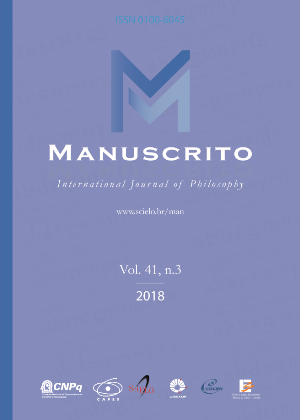Resumo
In order to evaluate the validity and implications of Donald Davidson’s arguments against the need for conventions in order for linguistic communication (or, more generally, against the need to postulate language as an entity in order to account for communication), the theoretical considerations behind his conclusions are traced through several of his essays. Once Davidson’s ideas on communication, radical interpretation, and the lack of strict nomological connections between physical and mental events have been pointed out as necessary for his argument, it will be seen that these imply the need for something very close to linguistic conventions. The article closes by considering a few possible counterarguments this last conclusion.Referências
ARMSTRONG, J. Coordination, Triangulation, and Language Use. Inquiry 59(1), 80-112, 2015.
ARMSTRONG, J. The problem of lexical innovation. Linguistics and Philosophy 39(2), 87-118, 2016.
AUSTIN, J.L. How to Do Things with Words. Great Britain: Oxford University Press, 1964.
BILGRAMI, A. (1992) Belief and Meaning: The Unity and Locality of Mental Content. Cambridge, MA: Blackwell Publisher, 1992.
CAIN, M.J. (2013) Conventions and Their Role in Language. Philosophia 41, 137-158, 2013.
DAVIDSON, D. (1964) Theories of Meaning and Learnable Languages. In: Bar-Hillel, Y. (ed.). Proceedings of the International Congress for Logic, Methodology, and Philosophy of Science. Amesterdam: North-Holland. Reprinted in: Davidson (1984) (pages 3-15).
DAVIDSON, D. (1967) Truth and Meaning. Synthese 17. Reprinted in: Davidson (1984) (pages 17-36).
DAVIDSON, D. (1970) Mental Events. In: Foster, L. & Swanson, J.W. (eds.), Experience and Theory. London: Duckworth. Reprinted in: Davidson: 2001b (pages 207-225).
DAVIDSON, D. (1973a) Radical Interpretation. Dialectica 27. Reprinted in: Davidson (1984) (pages 125-139).
DAVIDSON, D. (1973b) The Material Mind. Studies in Logic and the Foundations of Mathematics 74. Reprinted in: Davidson (2001b) (pages 245-259)
DAVIDSON, D. (1974a) Belief and the Basis of Meaning. Synthese 27. Reprinted in: Davidson (1984) (pages 141-154).
DAVIDSON, D. (1974b) Psychology as Philosophy. In: Brown, S. (ed.). Philosophy of psychology. New York: Harper & Row. Reprinted in: Davidson (2001b) (pages 229- 239).
DAVIDSON, D. (1974c) On the Very Idea of a Conceptual Scheme, Proceedings and Addresses of the American Philosophical Association 47, 5-20. Reprinted in: Davidson (1984) (pages 183-198).
DAVIDSON, D. (1975) Thought and Talk. In: Guttenplan, S. (ed.) Mind and Language. Oxford: Oxford University Press. Reprinted in: Davidson (1984) (pages 155-170).
DAVIDSON, D. (1976) Reply to Foster. In: Evans, G. & McDowell, J.H. (eds.) Truth and Meaning: Essays in semantics. Oxford: Clarendon Press. I Reprinted in: Davidson (1984) (pages 171-179).
DAVIDSON, D. (1982) Communication and Convention. Synthese 59. Reprinted in: Davidson (1984) (pages 265-280).
DAVIDSON, D. (1984) Inquiries into Truth and Interpretation. New York: Oxford University Press.
DAVIDSON, D. (1986) A Nice Derangement of Epitaphs. In: LePore (1986). Reprinted in: Davidson (2005) (pages 89-107).
DAVIDSON, D. (1991) Three Varieties of Knowledge. In: Phillips Griffiths, A. (ed.), A.J. Ayer Memorial Essays: Royal Institute of Philosophy Supplement, 30, Cambridge: Cambridge University Press. Reprinted in: Davidson (2001a) (pages 205-220).
DAVIDSON, D. (1992) The Second Person. Midwest Studies in Philosophy XVII. Reprinted in: Davidson (2001a) (pages 107-121).
DAVIDSON, D. (1993) Locating Literary Language. In: Dasencrock, R.W. (ed.) Literary Theory After Davidson. University Park: Pennsylvania State University Press. Reprinted in: Davidson (2005) (pages 167-181).
DAVIDSON, D. (1994) The Social Aspect of Language. In: McGuiness, B. & Oliveri, G. (eds.). The Philosophy of Michael Dummet. Dordrecht: Kluwer academic Publishers. Reprinted in: Davidson (2005) (pages 109-125).
DAVIDSON, D. (1999) Reply to James Higginbotham. In: Hahn, L.E. (ed.), The Philosophy of Donald Davidson (pages 687- 689). Illinois: Open Court.
DAVIDSON, D. (2001a) Subjective, Intersubjective, Objective. New York: Oxford University Press.
DAVIDSON, D. (2001b) Essays on Actions and Events. Oxford: Oxford University Press.
DAVIDSON, D. (2005) Truth, Language, and History. New York: Oxford University Press.
DUMMETT, M. A Nice Derangement of Epitaphs: Comments on Davidson and Hacking. In: LePore (1986) (pages 459-476), 1986.
GREEN, K. Davidson’s Derangement: Of the Conceptual Priority of Language. Dialectica 55(3), 329-258, 2001.
GOLDBERG, S.C. Radical Interpretation, Understanding, and the Testimonial Transmission of Knowledge. Synthese 138, 387-416, 2004.
HACKING, I. (1986) The Parody of Conversation. In: LePore (1986) (pages 447-458).
LEPORE, E. (ed.) (1986) Truth and Interpretation. Perspectives on The Philosophy of Donald Davidson. New York: Basil Blackwell.
LEPORE, E. & Ludwig, K. Donald Davidson. Meaning, Truth, Language, and Reality. New York: Oxford University Press, 2005.
LEWIS, D. (1983) Language and Languages. In: Gunderson, K. (ed.). Minnesota Studies in the Philosophy of Science. University of Minnesota Press. Minneapolis: University of Minnesota Press. Reprinted in: Lewis, D., Philosophical Papers. Volume I (pages 163-188). New York: Oxford University Press.
LUDLOW, P. Living Words. Meaning Underdetermination and the Dynamic Lexicon. Oxford: Oxford University Press, 2014.
MILLIKAN, R.G. (1998) Language Conventions Made Simple. Journal of Philosophy 95(4), 161-180. Reprinted in: Millikan (2005b) (pages 1-23).
MILLIKAN, R.G. (2003) In Defense of Public Language. In: Antony,L. N. & Hornstein, L. (eds.) Chomsky and his Critics. Oxford:Wiley-Blackwell (pages 215-237). Reprinted in Millikan (2005b) (pages 24-52).
MILLIKAN, R.G. (2005a) On Meaning, Meaning, and Meaning. In: Millikan (2005b) (pages 53-76).
MILLIKAN, R.G. Language: A Biological Model. Oxford: Oxford University Press. 2005b.
PIETROSKI, P. A Defense of Derangement. Canadian Journal of Philosophy 24(1), 95-117, 1994.
REIMER, M. What Malapropisms Mean: A Reply to Donald Davidson. Erkenntnis 60, 317-334, 2004.
SAUSSURE, F. de. Cours de linguistique générale. Paris: Éditions Payot & Rivages, 1995.
STAINTON, R.J. A Deranged Argument against Public Languages. Inquiry 59(1), 6-32, 2016.

